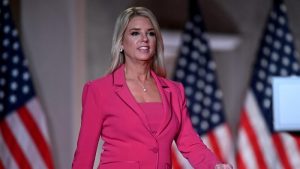The presidential election could put $250bn at stake for US businesses
This is an on-site version of the US Election Countdown newsletter. You can read the previous edition here. Sign up for free here to get it on Tuesdays and Thursdays. Email us at [email protected]
Good morning and happy Halloween. Steff will be back in the saddle on the big day next week. Today we’ll cover:
For the largest companies in the US, a quarter of a trillion dollars a year could be at stake — depending on who wins the presidential election [free to read].
Donald Trump has pledged to lower the corporate tax rate from 21 per cent to 15 per cent. That would further US businesses’ gains from the 2017 Tax Cuts and Jobs Act (TCJA), which lowered the rate from 35 per cent. Kamala Harris, meanwhile, plans to raise the corporate tax rate to 28 per cent.
What either candidate can accomplish, though, will depend on the political make-up of Congress.
“If Republicans sweep, you get one set of results,” said Rohit Kumar, who co-leads PwC’s national tax practice. “Democrats sweep, you get a different set of results. Divide the government and you get something somewhere in the middle. There’s no way to describe this other than that this is a significant fiscal event.”
On the campaign trail Harris has criticised the TCJA as a giveaway to billionaires and corporations, and Democrats have pointed to studies showing that the law has not benefited workers as advertised. The extent to which the law boosted corporate investment in the US also remains controversial — and is difficult to untangle from Covid-19’s impact on supply chains or the investments unleashed by President Joe Biden’s Inflation Reduction Act and Chips Act.
Economic modelling from bipartisan or independent experts has found that the TCJA led to expanded capital investment in the US. But there’s less agreement if that’s due to the headline rate cut or provisions such as larger tax deductions on some investments.
No matter who emerges as the White House’s next occupant, expect tax policy to stay on the agenda. The cuts in personal tax rates enabled by the TCJA are set to expire next year, and lawmakers are widely expected to revisit the issue.
Campaign clips: the latest election headlines

Listen to a special live Swamp Notes podcast where we recap the final FT-Michigan Ross poll results and explain why the economy remains top-of-mind for voters.
Behind the scenes
In 2022 Arizona enacted a law that required documentary proof of citizenship to vote and was challenged by civil rights groups. Litigation made its way to the US Supreme Court, which in August finally ruled to broaden these citizenship checks.
With this ruling justices granted the Republican National Committee’s request to reject state registration forms if voters failed to provide proof of citizenship, throwing the state’s enrolment system into uncertainty weeks ahead of the registration deadline.
The original citizenship requirement is part of a law sponsored by Jake Hoffman, a Republican Arizona senator who was indicted as a “fake elector” for allegedly seeking to overturn Joe Biden’s 2020 win. Hoffman has pleaded not guilty.
While it has long been illegal for non-citizens to vote in federal or state elections and violations are rare, the law’s proponents say it is needed to ensure electoral integrity.
“We want to maintain the sanctity of the vote,” said Warren Petersen, Republican president of Arizona’s Senate. “It is preposterous . . . to expect that we shouldn’t have ID required for something so sacred as the vote.”
But critics accuse Arizona Republicans of seeking to disenfranchise younger voters or minorities such as Latinos and Native Americans, who have historically favoured Democrats.
For Native Americans in particular, voting can be complicated. The remoteness of tribal lands can make travel to polling stations difficult, and non-traditional forms of address make it hard to register or receive ballots by mail. The elderly sometimes have no birth certificates at all due to home births.
“There’s a lot of disconnect on trying to put on requirements that we have no say in,” said Eileen Crocker, co-ordinator of White Mountain Apache tribe’s student programme.
Datapoint
The US is in its voting era. As of yesterday afternoon, more than 57mn Americans had already cast their ballot through early and mail-in voting.
Of those who voted early in states that report party registration data, 39.2 per cent are Democrats and 36.1 per cent are Republicans. (Though it’s worth pointing out that party affiliation is unknown for the majority of early voters, and experts caution that such early breakdowns are not predictive of the final result.)
So far, early voting figures are well below the pandemic-stricken 2020 election, but they’ve already surpassed 2016 levels.
We can also compare today’s polling with how it looked when Trump was previously on the ballot in 2020 and 2016. Trump has trailed his opponent heading into election day in all three instances, but this year he is behind by a much slimmer margin.
The Harris campaign is still optimistic that it can eke out a victory by appealing to the political middle and taking every battleground state seriously.
Hillary Clinton barely campaigned in Wisconsin, for example, and lost the state by less than 25,000 votes. Harris also hopes that pollsters who underestimated Republican support are now overestimating it, as they did in the 2022 midterm elections, when Democrats outperformed polls.
Viewpoints
-
Black Americans are not only drifting away from their generational support for the Democratic party, they appear to be checking out of politics altogether, writes Taylor Nicole Rogers.
-
In our Free Lunch newsletter, Martin Sandbu explains why he thinks Harris will win — by a solid margin. [Available for Premium subscribers]
-
Martin Wolf writes that if Trump wins, he would encourage rightwing populists around the world in a way that he did not manage to do in his first term.
-
In this election, Wall Street looks a lot like a swing state, Politico’s Sam Sutton writes from the Greenwich Economic Forum. (Politico)
-
Once Corporate America started to bend the knee to Trump, his qualms about big business melted at speed, columnist Janan Ganesh points out.
-
From unexpectedly divided Kent County, Michigan, it’s hard to see the upcoming poll settling things definitively anywhere in the country, writes Patti Waldmeir.
Recommended newsletters for you
FT Exclusive — Be the first to see exclusive FT scoops, features, analysis and investigations. Sign up here
Breaking News — Be alerted to the latest stories as soon as they’re published. Sign up here
#presidential #election #put #250bn #stake #businesses







